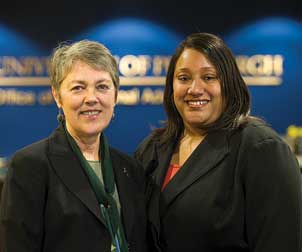Pitt Wages Record-Breaking United Way Campaign in 2010
 Anne Franks (left) and Michelle Page
Anne Franks (left) and Michelle PageThe University of Pittsburgh’s 2010 United Way campaign was the most successful in the University’s history, raising $609,023. The total surpassed the annual fundraising effort’s goal by more than $9,000 and marked a 12 percent increase from the 2009 campaign.
It broke the University’s previous record, $607,221, which was set in 2001.
Pitt’s 2010 United Way Live United for a Greater Pittsburgh campaign featured a significantly higher number of new donors, increased contributions from repeat donors, and a record-breaking number of online contributions via www.mypitt.edu, which brought in 82 percent of Pitt’s total.
Pitt has participated in the United Way of Allegheny County campaign for the past 14 years. It is the most comprehensive fundraising effort on campus—involving faculty and staff from every department in every school and administrative unit at Pitt, including the schools of the health sciences. Each of Pitt’s campuses conducts separate United Way campaigns; the record-breaking total was raised entirely by the Pittsburgh campus.
Much of the 2010 United Way campaign’s success at Pitt can be attributed to its steering committee, which includes representation from all areas of the University. The cochairs for the campaign were G. Reynolds (“Renny”) Clark, vice chancellor for community initiatives and chief of staff for Chancellor Mark A. Nordenberg, and Margaret C. McDonald, associate vice chancellor for academic affairs for the schools of health sciences.
In addition, Clark praised the efforts of Anne Franks, executive director of administrative services in Pitt’s Office of Institutional Advancement (IA) and Pitt’s United Way campaign manager, as well as Michelle Page, human resources manager for IA and the United Way campaign coordinator at Pitt. Franks has worked on the United Way campaign for six years, ensuring, according to Clark, that it is well structured and operates according to best practices. She and Page interacted frequently with the campaign’s 400 volunteers across the University.
Clark, who has been a cochair for the campaign for the past 10 years, said, “The success of our campaign is due singularly to the generosity of the Pitt faculty and staff. Our campaign steering committee members developed creative workplace programs and events to raise the awareness of their fellow employees to the services that the United Way agencies provide to individuals in local neighborhoods and communities who struggle with life every day. Reaching a new record of giving during these difficult economic times is a tangible example of the care and compassion that exist within the Pitt family.”
In addition to raising the most money for the United Way in Pitt’s history, the 2010 campaign featured other positive numerical trends, including 450 Pitt faculty and staff who increased their gifts from previous years, 718 new donors, and a 9 percent increase in leadership gifts (donations of $1,000 or more). The online donation option—made possible by the efforts of Pitt’s Computing Services and Systems Development—was another strong factor in the 2010 campaign’s success.
Prior to joining Pitt, both Franks and Page had worked in the nonprofit sector for United Way-supported agencies. Their experiences there helped to make them true believers in the organization’s cause, they commented.
“We’ve been on the other side—working at these nonprofit agencies that depend on funding from the United Way to survive and run their programs,” said Franks. “When people ask why they should donate, I feel perfectly comfortable telling them why.”
Franks also reviews agencies and their proposals seeking to be accepted as official United Way organizations. “I know what a stringent process you have to go through to receive United Way funding,” she added.
The top three agencies that Pitt staff and faculty support through the United Way campaign are Catholic Charities, the Greater Pittsburgh Community Food Bank, and the Women’s Center and Shelter of Greater Pittsburgh.
Individual departments within the University get very creative with their fundraising efforts. Franks said her favorites have included flea markets, recycling programs for electronics such as cell phones, silent auctions, the creation and sale of cookbooks, and snack carts.
“I see these fundraising activities as real team-building exercises,” she said.
Plans for a successful 2011 campaign are already under way. This is the time of year when Franks and her team reflect on the previous year’s campaign—discussing its challenges and strategizing ways to overcome them in the upcoming campaign.
“It’s exciting to see the generosity of the University community—to see how people really step up, even when budgets are tight and everyone is struggling,” Franks said. “Pitt demonstrated its commitment to Live United for a Greater Pittsburgh by raising more than $600,000 to support the people in our region who really need our help.”
Other Stories From This Issue
On the Freedom Road

Follow a group of Pitt students on the Returning to the Roots of Civil Rights bus tour, a nine-day, 2,300-mile journey crisscrossing five states.
Day 1: The Awakening
Day 2: Deep Impressions
Day 3: Music, Montgomery, and More
Day 4: Looking Back, Looking Forward
Day 5: Learning to Remember
Day 6: The Mountaintop
Day 7: Slavery and Beyond
Day 8: Lessons to Bring Home
Day 9: Final Lessons

